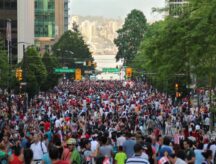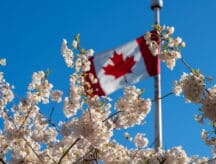New to Canada? You may be eligible for government-funded settlement services
Some newcomers arriving to Canada are eligible for settlement services.
Newcomers can take advantage of these government-funded services, which are intended to help support them in adapting to life in Canada.
Settlement services can help newcomers with tasks such as finding housing, improving language skills, finding employment, and even making new friends.
Studies have shown that newcomers benefit significantly from using settlement services. But nearly a third of immigrants who arrive in Canada are unaware of these services.
This article will break down
- Which newcomers are eligible to receive settlement services;
- What kinds of settlement services are available;
- How to find services in your area; and
- How effective these settlement services are.
Moving to Canada? Sign up for our special newsletter!
Who is eligible to receive settlement services?
Settlement services are programs that help newcomers adjust to life in Canada. They are delivered to newcomers by a number of immigrant supporting organizations that exist across Canada. These services are usually funded directly by Immigration, Refugees and Citizenship Canada (IRCC) but can also be funded by provincial and municipal governments.
Settlement services support immigrants in various aspects of their new lives, including daily needs, learning English or French, securing employment, and connecting with the community.
Settlement services are available to permanent residents, protected persons, and some temporary residents. Who is eligible for a service can also vary based on who is funding it. For example, most settlement services funded wholly by IRCC are only available to permanent residents of Canada.
For individuals settling in Quebec, settlement services are managed separately by the provincial government, while refugees have access to the Resettlement Assistance Program (RAP), which is also distinct from general settlement services.
The following individuals are eligible for most settlement services:
| Group | Eligibility Criteria |
|---|---|
| Permanent residents of Canada | All individuals who have been granted permanent resident status in Canada. |
| Protected persons (IRPA Section 95) | Individuals defined as protected persons under Section 95 of the Immigration and Refugee Protection Act (IRPA). |
| Individuals pending permanent residency approval | Individuals selected to become permanent residents (pending verifications) and informed by Immigration, Refugees and Citizenship Canada (IRCC) via a letter. |
| Convention refugees and protected persons abroad | Convention refugees and protected persons outside Canada who have been selected for resettlement in Canada by IRCC. |
| Temporary foreign workers with work permits, initially approved for permanent residency | Temporary foreign workers who hold or have received approval for a work permit under Section 112 of the Immigration and Refugee Protection Regulations (IRPR) or initial approval for permanent residency under Section 113 of IRPR. |
| Ukrainian nationals and their dependents | Ukrainian nationals who have been granted a temporary resident visa under the Canada-Ukraine Authorization for Emergency Travel, as well as their dependents, and other Ukrainian temporary residents in Canada, eligible until March 31, 2025. |
| Palestinian authority passport holders | Foreign nationals holding a passport issued by the Palestinian Authority who left Gaza on or after September 1, 2023, arrived in Canada by December 31, 2025, and hold valid temporary resident status. Eligible until March 31, 2027, as well as their family members. |
| Gaza/West Bank evacuees assisted by Canada | Foreign nationals who were assisted by the Government of Canada in leaving Gaza or the West Bank between November 1, 2023, and December 31, 2024, and who hold valid temporary resident status in Canada, as well as their family members, are eligible until March 31, 2027. |
| Atlantic Immigration Program (AIP) participants* | Temporary residents and their dependents selected by employers under the Atlantic Immigration Program are eligible for needs assessment, referrals, and information services. |
| Atlantic Immigration Program (AIP) applicants* | Temporary residents (and dependents) who have received confirmation of a complete Application for Permanent Residence under the Atlantic Immigration Program are eligible for support services that enable them to receive settlement services including, needs assessments, and community connections program components. |
| Rural and Northern Immigration Pilot (RNIP) applicants** | Temporary residents (and dependents) who have received confirmation of a complete Application for Permanent Residence under the Rural and Northern Immigration Pilot are eligible for support services that enable them to receive settlement services including, needs assessment, and community connections program components |
If newcomers are unsure about the eligibility of a service they want to use, they can contact the service provider to confirm.
*AIP candidates and applicants are eligible for newcomer services as detailed in their settlement plan.
**AIP and RNIP applicants may be restricted to settlement services delivered by providers in their community and city of settlement.
What kinds of settlement services are available?
Canada offers a range of settlement services, which encompass a number of aspects of life in Canada, including but not limited to the following:
- Pre-arrival services: Usually online services that newcomers can begin to access even before arriving in Canada, including employment help, information sessions on life in Canada, connecting with mentors, and more.
- Help with daily life: Includes guidance on understanding Canadian culture, housing, and health care systems.
- Job search assistance: Helps newcomers find employment through job listings, resume workshops, networking events, and interview preparation.
- Citizenship test preparation: Provides resources to help newcomers prepare for the Canadian citizenship test.
- Mentorship programs: Finding a mentor or friend to ease the transition into Canadian society.
- Language services: Offers language assessments and training to help newcomers improve their language skills in English or French, including job-specific language training.
- Targeted services for specific groups: Services tailored to the needs of refugees, women, seniors, youth, and 2SLGBTQi+ individuals.
- Additional services: Includes other community-based integration programs aimed at helping newcomers build a life in Canada, such as newcomer mixers, assistance for victims of domestic abuse, creating a settlement plan, and more.
How can I find settlement services around me?
IRCC provides an online tool that allows newcomers to search for IRCC-funded services by postal code, helping them locate the nearest available programs. The tool also includes search filters for specific services.
For services funded at the municipal or provincial level, newcomers can visit a number of sites to find immigrant serving organizations and settlement services in their area. A full list of settlement service directories by provinces and major cities can be found on our dedicated webpage.
Additionally, you can reach out directly to municipal or provincial governments (which often have dedicated settlement offices) to inquire about available programs.
Do settlement services really help?
The impact of settlement services in Canada has been studied, with promising results for newcomer success.
IRCC has reported results from the 2020 and 2021 Newcomer Outcome Survey (NOS), which investigates the outcomes of newcomers who used settlement programs.
The findings revealed that:
- 85% of clients (newcomers eligible for settlement services) reported being able to access services without difficulty.
- 95% of newcomers who received settlement services found them useful.
- Among those receiving language training, 89.5% reported improvements in their English or French skills, across reading, writing, listening, and speaking.
- 78% of individuals who received employment-related services felt these programs helped them acquire the knowledge, skills, and connections needed to succeed in the Canadian job market.
- 61% of newcomers who used community connection services met people they now consider close friends. Moreover, 92% agreed that their community was welcoming, and 90% felt a strong sense of belonging to Canada.
- Do you need Canadian immigration assistance? Contact the Contact Cohen Immigration Law firm by completing our form
- Send us your feedback or your non-legal assistance questions by emailing us at media@canadavisa.com







